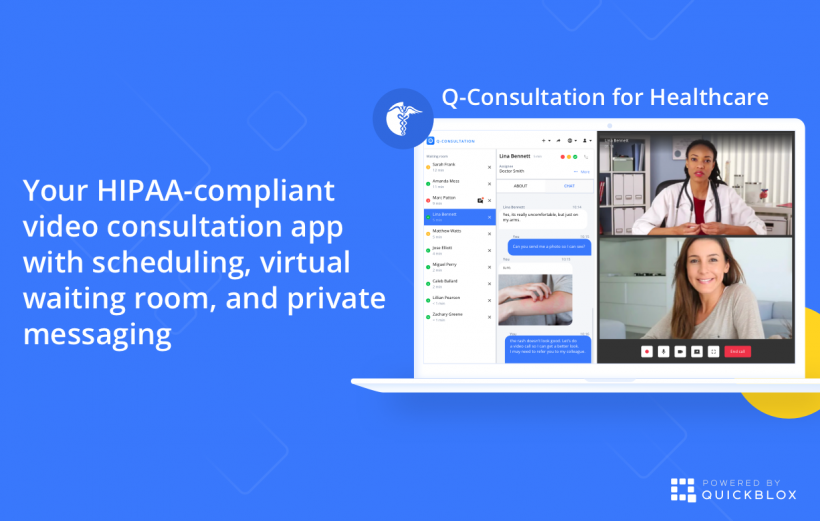The ability of patients to communicate with healthcare professionals via instant messaging has become increasingly commonplace. The Covid-19 pandemic rapidly enhanced the adoption and use of secure messaging apps in healthcare. The required social distancing and the unprecedented pressure brought to bear on healthcare organizations encouraged a significant investment in telehealth solutions, with more and more patient-doctor consultations happening remotely.
But even as the pandemic wanes, it is clear that secure messaging continues to play an important role in the provision of healthcare services. Both service providers and end users are acutely aware of the tangible benefits this form of digital communication provides.
What is Secure Messaging?
We are very familiar with messaging with friends and family on apps like WhatsApp, Telegram, Facebook Messenger, and WeChat. However, this form of messaging is not considered 'secure' even though they use encryption. This is because all personal data, chat history, and shared files are stored and controlled by the third-party messenger providers. WhatsApps' recent 225 million euro fine for violating GDPR data protection laws demonstrates that security concerns remain real.
By law, American healthcare organizations are required to ensure that additional measures are in place to protect all patient data including chat. Such requirements are set out in the Health Insurance Portability and Accountability Act of 1996 (HIPAA), which is federal legislation designed to restrict who has access to protected personal patient data. This not only means that communications need to be encrypted both in transition and storage, but also that healthcare and healthtech providers control and maintain sole access to the infrastructure that their chat application is hosting on. Failure to ensure secure HIPAA compliant messaging can lead to hefty fines.
But the threat of financial penalties should not deter healthcare organizations from utilizing instant messaging and other forms of digital communications in their provision of services. There are a variety of HIPAA compliant communication solutions on the market that offer secure and reliable instant chat and video calling.
CPaaS provider QuickBlox, for example, offers both chat SDKs and APIs that allow developers and healthcare organizations to custom-build their own secure chat solution, as well Q-Consultation, a HIPAA-compliant white label telehealth app that can be integrated into an existing healthcare software platform.
Let's look in more detail why healthcare benefits from the use of secure messaging.
Benefits of Secure Messaging
HIPAA compliant applications provide healthcare businesses and their patients with a range of benefits.
-
Ease and Convenience
For most patients, there is tremendous convenience being able to 'chat' with a doctor from the comfort of their home, especially if they are feeling unwell. Secure messaging allows doctors to provide on-going care. For individuals dealing with ongoing chronic illness, or are recovering from surgery, doctors can utilize secure messaging to check in on their progress, provide advice and pain-management, and support self-monitoring over a protracted period without requiring an in-person visit.
-
Greater workplace efficiency
Secure messaging between staff members can support workflows and enhance efficiency. While phone calls can be intrusion and emails get lost in inboxes, secure messaging delivers a clear real-time communication channel to relay important information. Staff can speak privately one-on-one, or an entire team can collaborate together about a patient within a single chat group. This easy flow of information makes for productive work practices and better patient health outcomes.
-
Time & cost effective
The ability to consult remotely with patients or other healthcare professionals helps minimize costs involved with travel and missed appointments. Doctors can promptly share important test results with patients and staff without delay, or seek clarification or further information from colleagues in real-time. There's no need to physically see other people you need to speak to when they are easily available on your messenger app.
-
Embeddable compatible solution
Today it's possible to embed a chat solution within a hospital's existing software platform including their EHR. This means data is synced. A doctor can pull a file from the patient's EHR and send it as an attachment to a patient in a chat in a matter of seconds. In the same way a chat history will be automatically entered into the patient's record, making it available for other healthcare professionals. Integrating secure messaging applications in this way facilitates the easy and necessary exchange of important information.
Conclusion
It's clear that secure messaging has enormous benefits for healthcare, ensuring its longevity. The onus is on the provider, however, to take care that they use a HIPAA compliant messaging solution. Telehealth apps like Q-Consultation are increasingly becoming a necessity in the post-Covid healthcare landscape. In addition to sharing important patient information without the worry of breaching regulatory compliance, healthcare professionals want to rely on convenient, direct, real-time forms of communication that secure messaging offers.
* This is a contributed article and this content does not necessarily represent the views of sciencetimes.com















